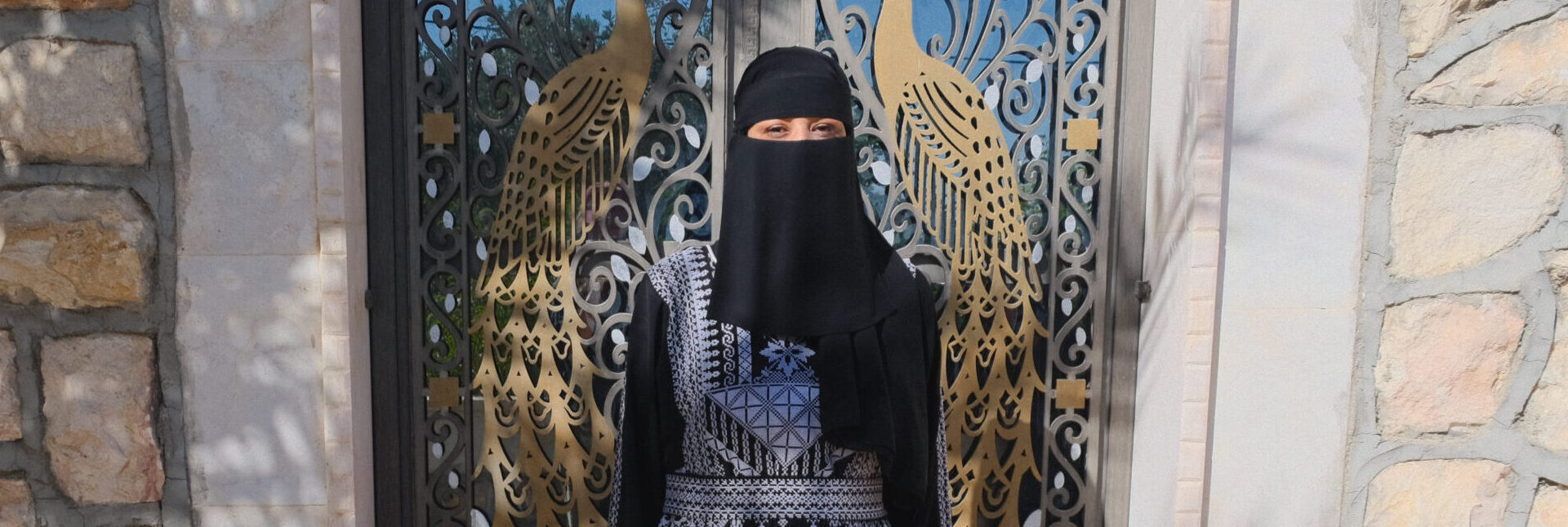(تنزيل النسخة العربية أدناه)
This isn’t just the success story of a Jordanian female artist; it’s the story of a woman of extraordinary courage and determination. A woman who took a path no one had dared to take before. She boldly reached for the stars, refusing to accept rejection. With only a handful of resources and an unwavering belief, she turned the impossible into reality.
Times of Despair
I first met Wejdan Aljazi at the URI MENA office in Amman. She was there for a workshop marking the end of a Train-the-Trainer program for women from the Cooperation Circles across Jordan. On that day, Wejdan wasn’t feeling well, and we didn’t talk much. During the lunch break, she showed me some of her artwork on Instagram. At the time, I didn’t know much about her. Our paths crossed again when she came to pick up a painting from the URI MENA office to pass it on to the Dutch ambassador. I was surprised and curious. Shortly after, I reached out to her to set up an interview.
Wejdan is a 39-year-old Bedouin woman living in Al-Husseiniyah, a village near Ma’an in southern Jordan. This region is deeply tied to Bedouin culture, known for its rich traditions of storytelling, hospitality, and craftsmanship. While these traditions remain a source of pride, the local economy in and around Ma’an faces challenges, with high unemployment rates—particularly among women – contributing to limited opportunities for personal and professional growth.
Wejdan has loved painting since childhood; it was an activity that allowed her to fully relax. Though her family supported her, her friends and community were less encouraging. They doubted she had the character to be an artist. In her culture, women rarely pursue art as a profession, and there were no art classes nearby – so Wejdan taught herself to paint and kept all her artworks for herself.
After school, she did not continue to develop her artistic skills, but instead studied Early Childhood Education at the university in Ma’an – it was the only course where no male students were present. However, she didn’t enjoy the work and struggled to find employment after graduating. Married to her husband Hussein for 16 years, Wejdan has no children. Five years ago, when Hussein’s mother passed away, he fell into deep sadness, feeling isolated. At the time, their families were estranged, and eventually, Wejdan’s family decided to bring her back home.
This separation plunged Wejdan into a period of despair. For one month, she could barely get out of bed and didn’t want to talk to anyone. She was heartbroken. Her family tried to cheer her up, but nothing worked.
Then, one day, she watched a video by Ammar Shehab, a motivational coach from Amman. He spoke about becoming the best version of oneself, doing what you love, never giving up, and rising again, no matter how many times you fall. Something in her shifted as she listened to his words; they resonated deeply within her. She got up from bed, and seeing her brother about to leave for the market, she said, “I’m coming with you!”
Her brother’s face lit up in surprise. “Really? You want to come with me?” She hadn’t been out in weeks, but that day, she chose to take a step forward.
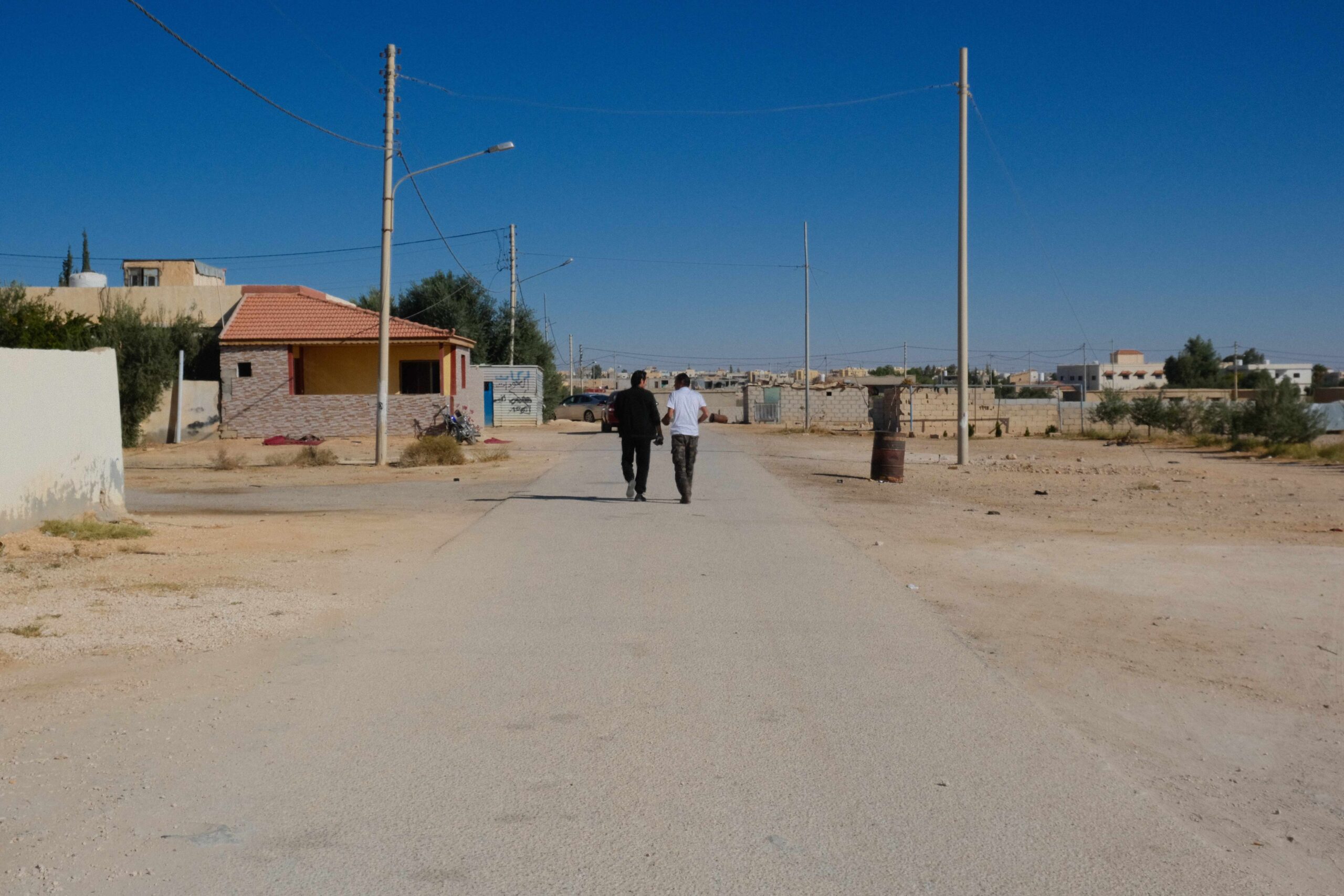
The First Steps and the First Supporters
With the little money she had, Wejdan bought a few art supplies and began painting again. Her first piece depicted a horse with what she describes as “eyes full of strength.” Her second painting, a Bedouin scene, she shared with her small circle of WhatsApp contacts. One friend, surprised by her talent, suggested she paint flowers on wooden discs and sell them in Petra, one of the main tourist attractions in Jordan. Although she considered it, she decided instead to focus on scenes from Bedouin and local culture.
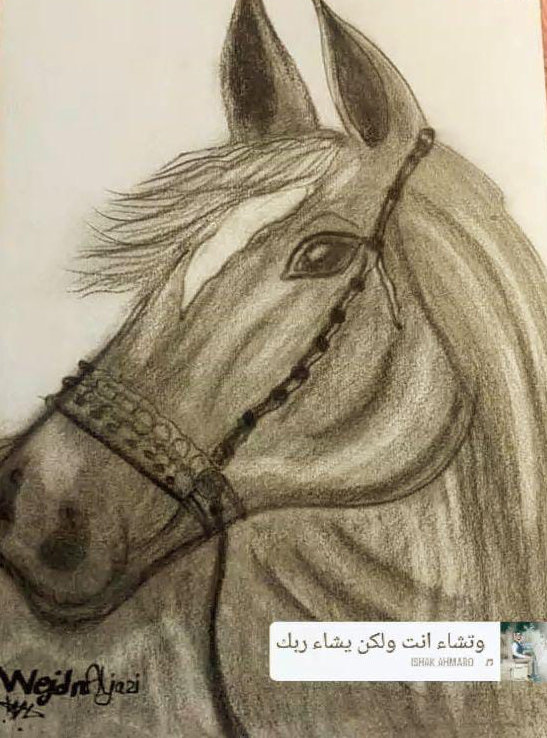
Art supplies were expensive and there was only one shop in Ma’an, but the shop owner helped her in the beginning. Eventually, Wejdan joined a nearby art class, where the teacher was astonished by her talent. She shared her first painting of the horse, and he was surprised to learn she had painted it herself.
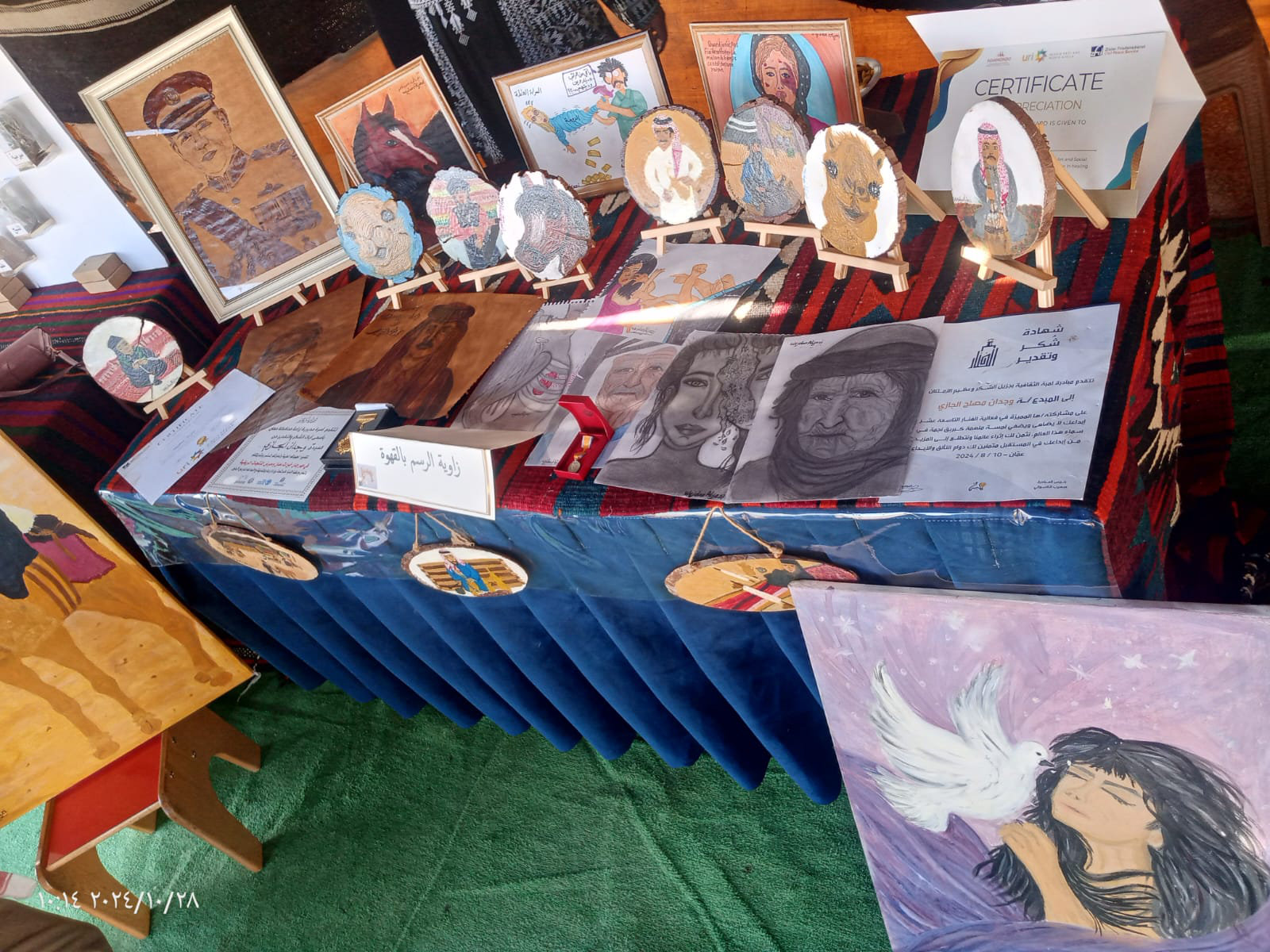
Meanwhile, her husband, Hussein, was trying to reconcile with her family, hoping they would allow her to return to him. During this time, Wejdan started posting her paintings on Instagram. She added a profile photo, but soon people informed her family that she had shown her face online without a niqab. While her family remained supportive, they asked her to delete the picture. She continued sharing her art, using a niqab in any photos that included her.
She then took another course, where she learned to paint on wood. Her works depicting Jordanian and Bedouin culture soon caught the attention of a local tourist camp manager, who invited her to showcase her art at an event at his camp. There, people from the Dutch embassy noticed her talent and later offered financial support to help her continue her artistic journey.
One day, as Wejdan sat down with a blank sheet of paper, she thought about how she could thank the people from the Dutch Embassy who had helped her. She wanted to create something unique, a piece that would express her gratitude. As she thought, she accidentally spilled her coffee over the page. She looked at the stain for a moment, puzzled – then inspiration struck. Why not paint with coffee?
This happy accident opened up a new medium for her, giving her a way to bring the essence of her culture into her art.
Overcoming Obstacles
At one point, Wejdan’s uncle called with exciting news: people from URI MENA were nearby, and he encouraged her to show them her paintings. This marked her first encounter with the organization. Inspired by this experience, Wejdan began sharing her artwork more widely on social media, proudly using her own name, and soon received requests for commissioned pieces.
During all that time, Hussein never gave up on bringing Wejdan home. He sought the help of influential men who visited her family, and one even promised to take her under his personal protection and ensure her well-being with Hussein. After four months, her family finally agreed, and Wejdan returned to her husband, who had now become one of her strongest supporters.
URI MENA soon invited Wejdan to attend a street art workshop in As-Salt, a town three hours away from her home village. This workshop was a transformative opportunity to develop her skills and connect with other artists. This presented a challenge not only for Wejdan but also for Hussein. In Bedouin culture, it’s rare for women to travel alone or attend events far from home, and this would be her first time traveling such a distance on her own. People around them pressured Hussein not to let her go. He found himself at a crossroads: Should he keep her at home, taking away this critical opportunity, or go against the opinions of those around him and support her?
In the end, Hussein made a choice. He accompanied Wejdan on the bus ride to As-Salt, and there, she asked him to let her continue alone. She urged him not to listen to the voices around him and to allow her this chance to grow. After a pause, he handed her money for the return trip, leaving her in As-Salt to participate in the three-day course on her own. Then, he turned back home alone.
This decision marked a turning point for Wejdan. Those three days gave her the confidence and encouragement she needed to move forward, leaving her feeling stronger and prouder than ever. From that moment, she vowed never again to let anyone limit her ambitions.
She continued to participate in URI’s training sessions in Amman. At first, Hussein accompanied her, staying in a hotel nearby while she attended classes. But gradually, his trust grew, and soon she was traveling to Amman for courses on her own. It was a remarkable step forward for both of them, and Wejdan knew her path to self-development was finally unfolding.
Trying the Impossible
Around a year ago, Prince Hussein bin Abdullah got married, and Wejdan was inspired to create a unique wedding gift: a portrait of the prince painted with coffee. She dreamed of presenting it to him personally, but doubts crept in. Was her painting good enough? And how would she manage to meet him in person?
Turning to her ever-supportive uncle, she showed him the portrait and asked if he could recognize who it was. “Of course!” he replied. “That’s Prince Hussein bin Abdullah.” His reaction gave Wejdan the confidence she needed; her painting was indeed fit for a wedding gift to the prince. Her uncle encouraged her to give the painting to no one else, cautioning that someone might present it as their own work. Instead, he urged her to find a way to personally deliver it to the prince.
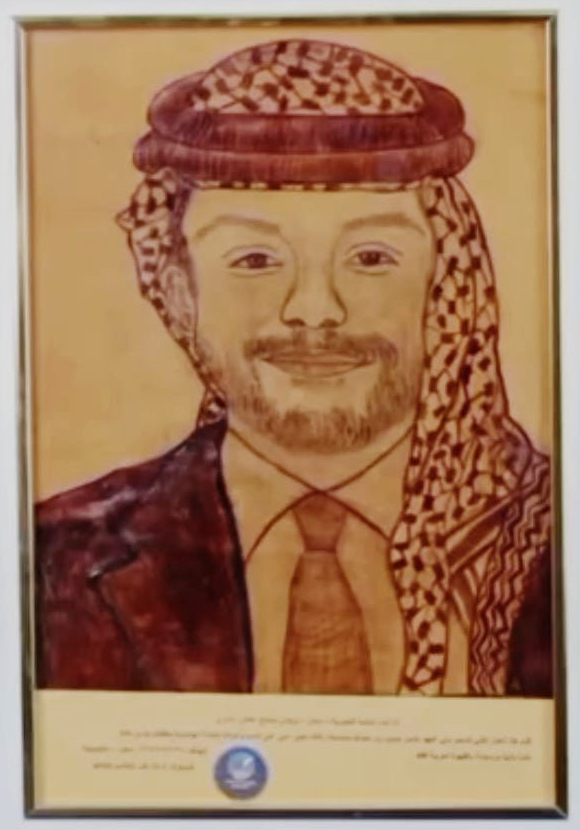
Many people insisted it would be impossible to arrange such a meeting, but Wejdan held onto her painting, determined to find a way.
She decided to post the painting on social media, tagging it with the prince’s name. Then, out of nowhere someone reached out to her, expressing his admiration and asking if she wanted the phone number of the prince’s office. Wejdan couldn’t believe it and said that she would very much like to have this number. The guy sent her the number of the manager of the prince’s office.
Another step towards her dream.
With a mixture of hope and nervousness, she dialled the number every day for two weeks, except Friday, a holiday in Jordan, but no one picked up. Again, it seemed that her dream to meet the king was impossible.
Eventually, her husband Hussein suggested she try on Friday. “Friday?” she responded. “It’s impossible! It’s a holiday!”
But even so, Hussein dialled the number himself. To their surprise, someone answered.
The man on the other end sounded irritated that his private number had been called. He curtly informed her that this wasn’t the prince’s office number, demanded to know where she’d gotten it, and promptly hung up.
Disheartened but undeterred, Wejdan decided to send him a WhatsApp message. She explained that she’d been trying to reach him for two weeks and wished to gift the prince a painting. She even pointed out that it was frustrating that he’d hung up right when they finally got through.
A moment later, the man called back, laughing. It turned out that indeed he was a manager of the prince’s office, that this was his private phone number, which he used only on Fridays, and he was startled to receive a call about a painting on his day off.
Amused and impressed by her persistence, he arranged an appointment for her to come to the prince’s office in Amman.
“If they try to send you away, don’t accept it.”
Wejdan traveled to Amman on the agreed day, full of hope, but upon arrival, the reception staff informed her that no appointment had been scheduled. Despite this setback, she refused to leave, waiting from 8 in the morning until 5 in the evening in the waiting area. At one point, she knocked on another door, thinking she might be at the wrong office. The prince’s photographer answered, and after hearing her story and seeing the portrait, he offered to deliver it to the prince himself, though he insisted she couldn’t meet him personally. Wejdan declined. By 5 p.m., the office closed, and Wejdan was asked to leave.
Feeling defeated, she considered returning to Ma’an and called her husband Hussein, who encouraged her to try again the following day and suggested she stay in a hotel in Amman for the night. After doing some shopping in Downtown, she returned to the hotel, gazing sadly at her painting. Had it all been for nothing?
Suddenly, her phone rang. It was the man from the prince’s office. He asked where she’d been, explaining that he’d been busy all day but told her to return at precisely 10 a.m. the following day. “If they try to send you away, don’t accept it. Call my number,” he instructed.
The next day, Wejdan arrived at the office promptly at 10. Again, the reception told her she had no appointment, but this time she called the manager’s number. He came to the reception himself and escorted Wejdan in his car to an inner part of the building.
In his own office, he invited her to sit and offered her a drink. Noticing she still seemed a bit downhearted, he assured her she could stay in the office as long as she wanted. But Wejdan responded that all she wished was to hand her painting to the prince. The manager explained this wouldn’t be possible but offered her anything she wanted as compensation for the painting. Wejdan thought for a moment, remembering that her husband had lost his car some time ago. She asked if perhaps she could have a car for Hussein.
Later that day, a proud and joyful Wejdan drove back from Amman to her village in Ma’an – behind the wheel of a new car, a gift from the prince himself. It had taken her two months to achieve a goal that everyone had said was impossible. Her resilience, perseverance, perhaps a touch of what some might call stubbornness – and, as Wejdan would say, God’s help – she had earned her respect and admiration from the entire community.
Visions and Further Successes
Some time later, the people of the Dutch embassy that had supported Wejdan at the start of her artistic journey came to Ma’an. Wejdan was about to speak with the ambassador to thank him, but a man from Ma’an told her to remain silent. The ambassador, however, wouldn’t accept this and insisted that Wejdan speak. He even invited her to visit his office in Amman.
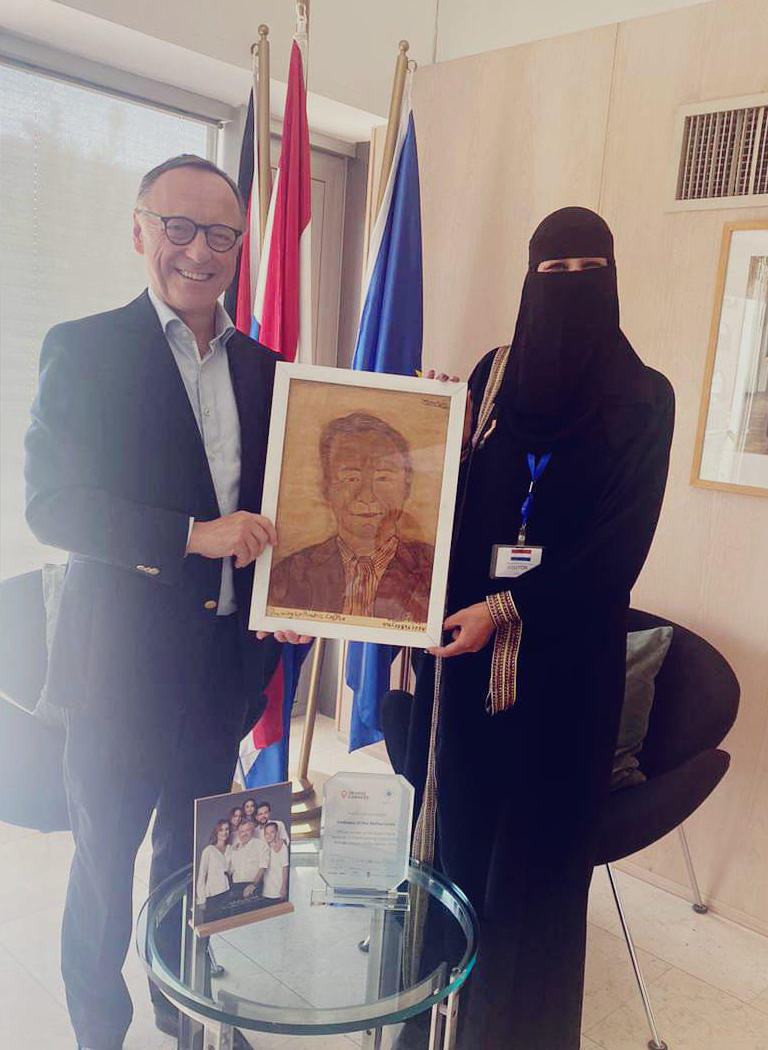
When Wejdan later sat in his office, he asked her what she thought were the challenges women faced in her region and what they needed. Wejdan explained that, for example, many women weren’t allowed to travel, especially outside Jordan. She told him that there were many talented women in the area, but few opportunities to develop their skills. Many women were not allowed to create social media profiles to showcase their art or other talents. Wejdan’s dream is to establish an academy for women in the region – a place where they can develop their skills and have the chance to sell their art. She envisions an organization dedicated to supporting women.
Recently, URI MENA published an article about Wejdan. Her brother initially didn’t want her full name to be shown on that article, but Wejdan decided to go ahead and have her name put under it. Her brother ended up feeling proud and happy for her.
Also, the Jordanian company ORANGE recently launched a campaign to highlight the success stories of four Jordanian women, and Wejdan is one of them. Her uncle also helped arrange for a princess from Dubai to visit her to see her artwork. Additionally, the same motivational coach from Amman who inspired Wejdan so much in her time of despair, invited her to one of his courses.
Wejdan emerged from her depression and despair stronger than before. It was during this difficult time, while she was separated from her husband, that she laid the foundations for her artistic career.
When I asked her what had helped her through this challenging period, she said, above all, it was her unwavering faith in God.
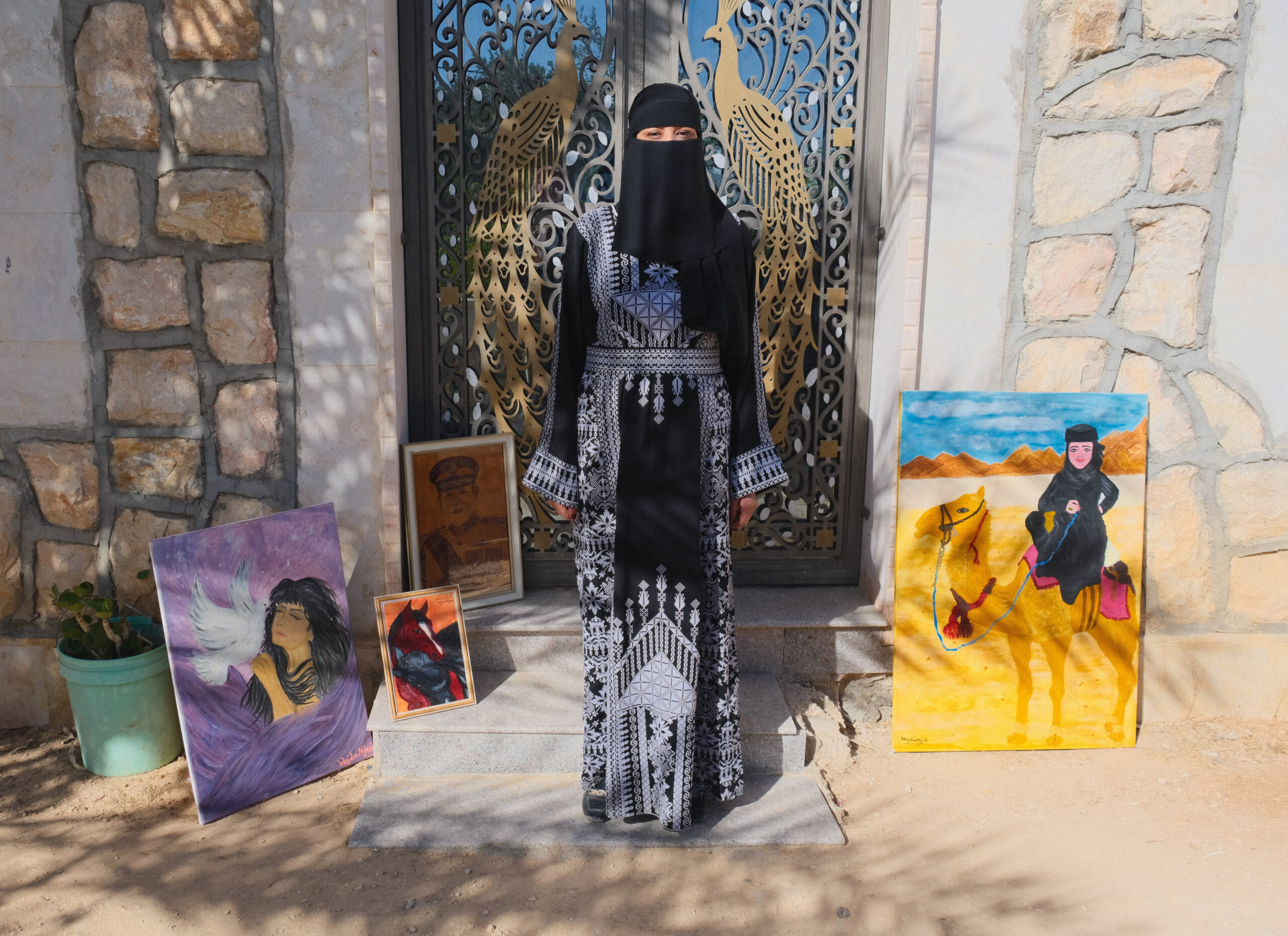
Click here to find Wejdan on Instagram.
